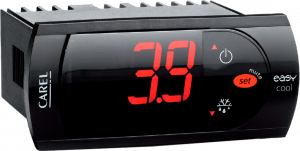carel
Carel cooling controllers
New models Carel cooling controllers have Modbus RTU, while older models have a proprietary Carel communication protocol. The protocol is quite efficient one, becuase it only sends changes of its parameter, or “no changes” telegram. So the host syncronize its variable once and then gets updates.
Older controllers have the following communication features:
The modules often do not have an integrated RS-485 driver, and the connection must be made to the TTL serial bus port via TTL-RS485 converter. The default transmission format - 19200, 8 data bits, no parity, 2 stop bits.
These modules can be read with the custom protocol. Turn to your local representative for more details.
- -example.lua
function readRegister (reg, device, unitId) if not carel.synced then DEBUG("Trying to sync, packet #1...") local newId = unitId + ADDR_OFFSET carel.pollTemplate[2] = newId makeSync(carel.syncTemplate, newId) local reply = readUntil(ETX, true) if reply then hexPrint(reply) if (#reply > 30) then DEBUG("Sync 1 done!") -- now 2nd sync makeSync(carel.sync2_Tmpl, newId) reply = readUntil(ACK, false) if reply then hexPrint(reply) ; DEBUG("sync 2 ok!") carel.synced = true end end end end if carel.synced then -- synced local poll_counter, POLL_LIMIT = 0, 40 repeat poll_counter = poll_counter + 1 sendBytes(carel.pollTemplate) ; local reply = readUntil(ETX, true) if not reply then ERROR("could not receive reply from device...") carel.synced = false return false end if (reply[1] == NULL) then DEBUG("Got NULL! - no changes") sendBytes{ACK} break else DEBUG("Normal sequence, got something!") sendBytes{ACK} local idx = {type = 3, addr_hi = 4, addr_lo = 5, data_start = 6} local type_ = string.char(reply[idx.type]) ; DEBUG("type = " .. type_) if not (type_ == 'B' or type_ == 'U' or type_ == 'S') then ERROR("Unknown type of the device!") return -1 else local dev_addr = getHexFromASCII(reply[idx.addr_hi], reply[idx.addr_lo]) dev_addr = string.sub(dev_addr, 1, -2) dev_addr = tonumber(dev_addr, 16) ; DEBUG("dev_addr detected = " .. dev_addr) local dev_data_len = ((type_ == 'B' and 2) or 4) local tmp_t = {} for j = idx.data_start, idx.data_start + dev_data_len - 1 do table.insert(tmp_t, string.char(reply[j])) end local dev_data = tonumber(table.concat(tmp_t), 16) DEBUG('dev type addr data = ' .. type_ .. ' ' .. sf("%X", dev_addr) .. ' ' .. sf("%X", dev_data)) carel.data[type_][dev_addr] = dev_data end end if (poll_counter >= POLL_LIMIT) then DEBUG("Poll counter finish!") end until (poll_counter >= POLL_LIMIT) local value = carel.data[device.name][reg.internalAddr] return value end -- synced end -- readRegister
carel.txt · Last modified: 2022/01/15 17:31 by 127.0.0.1
